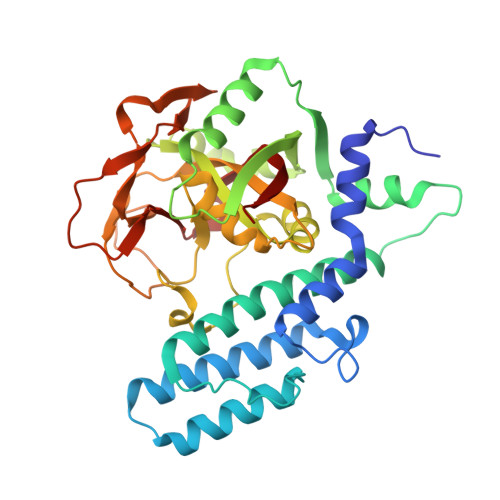Discovery of Pamiparib (BGB-290), a Potent and Selective Poly (ADP-ribose) Polymerase (PARP) Inhibitor in Clinical Development.
Wang, H., Ren, B., Liu, Y., Jiang, B., Guo, Y., Wei, M., Luo, L., Kuang, X., Qiu, M., Lv, L., Xu, H., Qi, R., Yan, H., Xu, D., Wang, Z., Huo, C.X., Zhu, Y., Zhao, Y., Wu, Y., Qin, Z., Su, D., Tang, T., Wang, F., Sun, X., Feng, Y., Peng, H., Wang, X., Gao, Y., Liu, Y., Gong, W., Yu, F., Liu, X., Wang, L., Zhou, C.(2020) J Med Chem 63: 15541-15563
- PubMed: 33264017
- DOI: https://doi.org/10.1021/acs.jmedchem.0c01346
- Primary Citation of Related Structures:
7CMW - PubMed Abstract:
Poly (ADP-ribose) polymerase (PARP) plays a significant role in DNA repair responses; therefore, this enzyme is targeted by PARP inhibitors in cancer therapy. Here we have developed a number of fused tetra- or pentacyclic dihydrodiazepinoindolone derivatives with excellent PARP enzymatic and cellular PARylation inhibition activities. These efforts led to the identification of pamiparib (BGB-290, 139 ), which displays excellent PARP-1 and PARP-2 inhibition with IC 50 of 1.3 and 0.9 nM, respectively. In a cellular PARylation assay, this compound inhibits PARP activity with IC 50 = 0.2 nM. Cocrystal of pamiparib shows similar binding sites with PARP with other PARP inhibitors, but pamiparib is not a P-gp substrate and shows excellent drug metabolism and pharmacokinetics (DMPK) properties with significant brain penetration (17-19%, mice). The compound is currently being investigated in phase III clinical trials as a maintenance therapy in platinum-sensitive ovarian cancer and gastric cancer.
















